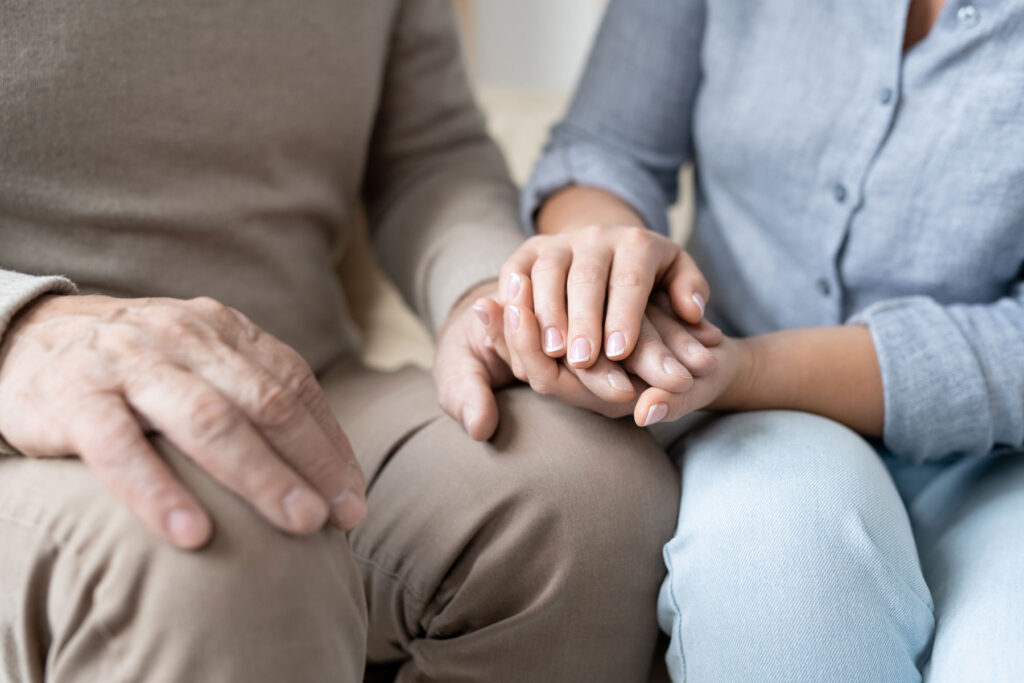It’s hard to watch a loved one struggle with depression—especially when they try to hide it. While it’s normal to experience sadness after loss or illness, depression is not a normal part of aging. It’s often under-diagnosed, misunderstood, or brushed off as “just getting older.”
But noticing the signs and starting the conversation can make all the difference.
If you’re concerned about your parent, trust your gut
Maybe your mom seems quieter than usual. Maybe your dad’s lost weight and no longer finds joy in the hobbies he used to love. Whatever brought you here, it shows how much you care—and that you’re willing to take action.
Depression in older adults
As people age, they face a number of life changes—some of them difficult. Health challenges, losing lifelong friends or a spouse, or fears about money or independence can all increase the risk of depression.
And depression doesn’t always show up the way you’d expect. In older adults, it often overlaps with other medical conditions or gets dismissed as “slowing down.”
Sometimes, the people we love don’t want to burden us. They might insist they’re fine or not want to “bother” anyone. But you may notice subtle changes that point to something deeper.
Signs of depression in older adults
Symptoms of depression may not look like sadness. Here are some things to look for in a parent or aging loved one:
- Memory problems or confusion
- Social withdrawal or isolation
- Loss of appetite and unintentional weight loss
- Fatigue or difficulty sleeping
- Unusual irritability or moodiness
- Vague physical complaints or aches and pains
- Neglecting housework or personal hygiene
- Hallucinations or delusions
Even small changes in routine, behavior, or personality may indicate that something’s off. A parent who once kept a spotless home may stop tidying. Someone who was always cheerful may seem quick to anger or emotionally distant.
What depression is not
It’s important to distinguish depression from normal sadness or grief. Depression is not just a bad mood—it’s a medical condition that won’t resolve on its own.
And while it may be tempting to tell your parent to “snap out of it,” that often comes from misunderstanding the weight of what they’re going through. Depression can linger for months or years if left untreated and is linked to higher risks of illness and even suicide in older adults.
But it doesn’t have to be that way. Depression is treatable—and there is hope.
What to do if your parent seems depressed
If you notice these changes in your loved one, start with compassion. Older generations often carry stigma around mental health and may not feel comfortable opening up.
Try language like:
“It seems like you haven’t been feeling like yourself lately. I wonder if there’s something we can do to help you feel better?”
Then, gently suggest speaking with a doctor—especially if your parent has a strong, trusting relationship with their primary care provider. A familiar voice often holds more weight and may help your parent feel less defensive.
It can also be helpful to call the doctor ahead of time to share what you’ve noticed. (You may need a health care proxy in place to do this.)
How assisted living can help seniors facing depression
If your parent lives alone and seems withdrawn or down, it may be time to start exploring assisted living. Many seniors thrive when they have access to consistent connection, structure, and purpose in their day.
At The Arbors and The Ivy, we’ve seen how social interaction and a sense of belonging can lift spirits and boost emotional wellness. Our assisted living communities offer daily activities, peer support, and opportunities for residents to feel valued.
From participating in group outings to leading a craft table or sharing a favorite recipe with neighbors, residents here find meaningful ways to re-engage with life.
“Our residents want to feel useful,” says a team member at The Arbors. “And they should. They still have so much to share.”
How our communities support emotional wellness
If your parent is showing signs of depression, we’re here to support you in the next steps. Assisted living isn’t just about care—it’s about creating a new chapter of joy, connection, and comfort.
Learn more about how our communities can help your loved one feel more like themselves again. Contact us for more information and additional resources today.

